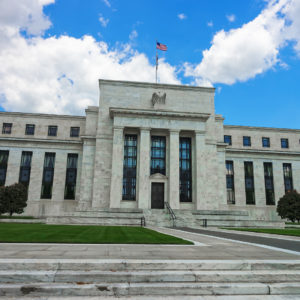With the global economy in the throes of yet another round of asset market price bubbles, there would appear to be a strong case for a rethink of the way in which the Federal Reserve implements monetary policy. However, it would not involve the idea of raising the Fed’s inflation target, which seems to be gaining support in academic and policymaking quarters. Rather, it would involve the Fed paying more attention to asset price inflation when setting interest rates, as well as to being ready to use helicopter money in the event that the global asset market price bubble were to burst.
In a recent Financial Times interview, Bill Dudley, the current head of the New York Federal Reserve, lent his voice to those like Ben Bernanke, Olivier Blanchard, and Paul Krugman in pushing the Fed to have a higher inflation rate target than it currently has. The basic idea is that if the Fed’s inflation target were to be raised above its current 2 percent level, there would be more room for it to cut real interest rates than it has today in the event of an economic recession.
It would seem that pushing for a higher inflation target at this stage of the cycle is singularly inappropriate, since there already is the real risk that the U.S. economy is overheating. Not only is the economy very close to full employment and growing at a healthy clip but it is also now receiving a strong boost from the recent tax cut, the 30 percent increase in stock prices, and the 10 percent depreciation of the U.S. dollar over the past year.
The last thing that an overheating U.S. economy needs now is a change in the inflation target that would allow for today’s unusually easy monetary policy to be maintained for longer than otherwise would be the case. This is especially the case considering that the continued maintenance of an easy monetary policy stance would risk further inflating the asset price bubbles that are already evident in the global stock market, the global bond market, and selected housing markets in systemically important countries around the world.
If there is a case for a monetary policy rethink, it is that the Fed should be paying much more attention than it currently is to asset price inflation.
It should do so first by taking asset prices into account more than it currently does in its setting of interest rate policy. In this respect, it is striking that, despite the fact that equity prices have increased by around 30 percent over the past year, the Fed has virtually stuck to the interest rate path that it set out for itself at the start of 2017.
This is all the more surprising considering that such an increase in equity prices must in itself be expected to provide the economy with a boost of more than 1 percent of GDP. That would be the equivalent of several interest rate cuts at the very time that the economy is being further boosted by the recent tax cut and by a weak dollar.
Second, the Fed should be giving serious thought to the use of helicopter money, rather than to yet another round of quantitative easing, in the event that the world’s present asset price bubbles were to burst. By financing on the easiest of terms a government grant to each citizen in the event of an asset price bust, the Fed would be providing a much-needed boost to the economy at the time of weakness.
However, unlike has been the case with the aggressive use of quantitative easing, helicopter money would boost the economy without being perceived as favoring Wall Street at the expense of Main Street. More important, it would do so without the risk of creating another asset price bubble that would set up the stage for yet another global boom-bust cycle.
The late professor Rudi Dornbusch said of the Mexican central bank board that by being composed of humans, he could understand them making mistakes. However, what he could not understand was how the same people could keep repeating the same mistakes time and time again.
It is hoped the Fed will have learned how dangerous it has been for it not to give due regard to asset price inflation in implementing monetary policy and we will not be able to say of it what Dornbusch said of the Mexican central bank board.

